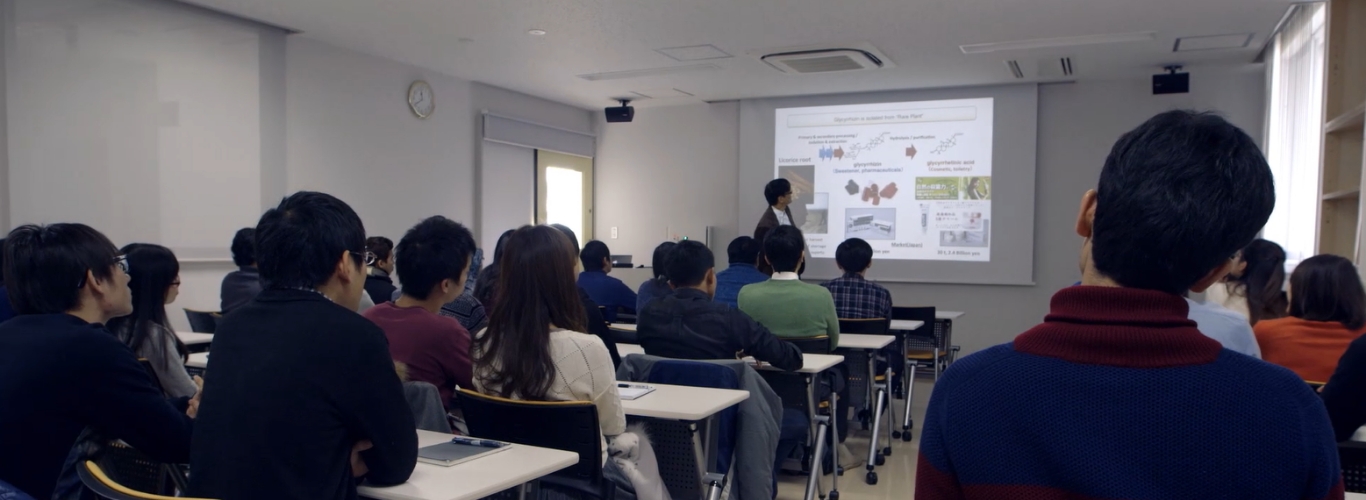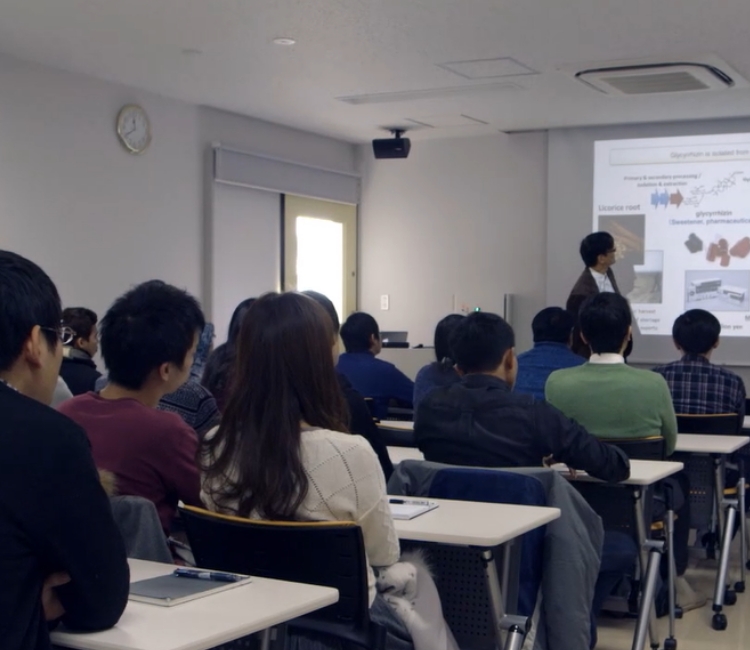English Course - Curriculum


Curriculum
Besides education and research related to Biotechnology, we are conducting joint-project with industry as well as human resource exchange, facilitating contribution to achieve sustanable development goals (SDGs). Classes and officail presentations are all conducted in English. We also conduct industry-internship on campus. You will grow up as a researcher with global and industrial perspective through our program.
Representative contents in Master and PhD courses
Apr./Oct.Master course 2 yrs
- ●Research for Master’s Thesis
- ●Basic Courses
- ●Project-Based Training
- ●Japanese Language
- ●Safety of Engineering, and more
Apr./Oct.PhD course 3 yrs
- ●Research for PhD Thesis
- ●Frontier Research Proposal
- ●Writing Journal Papers
- ●Japanese Language
- ●Presentation in International Conferences, and more

Molecular
Biotechnology
Bioresource
Engineering
Molecular
Genetics
Microbiology
Advance
Bio-environmental
Science
Cell Manufacturing
Molecular
Microbiology
Dynamic Cell
Biology
Bioprocess
Engineering
Cell Technology
Advance
Nanobiotechnology
Biotechnology
Advance
Important Feature
-
1.
English will be used in all lectures, instructions, and research related activities. In the Basic Course, students will acquire a solid background in advanced biotechnology. In the Project-based Training Course, students will acquire the ability to design and execute research in a critical manner. In the Thesis Research, students will acquire the ability to propose and implement their original research. Through immersion in their own research projects, students will have ample time during the remaining four years to attain their Master's and Doctor's Degrees in Engineerin
-
2.
The Basic Courses, which will be held in the first semester of master's program, will deal with a wide range of subjects: advanced biotechnology, and basics and application s in the files of "Biotechnology," "Life Science," and "Biochemistry."
-
3.
In the first semester of the master's program, students will take the Project-based Training Course. This course is designed to prepare students as research engineers with the ability to conceive innovative ideas, by synthesizing knowledge from different disciplines and the techniques for devising research plans towards realizing the ideas. In this course, each student will choose one laboratory different from their own, and will perform a short term research work under the supervision of the professor of that lab.
-
4.
All students will conduct their Thesis Research in the second, third, and fourth semester of the master's program, under the supervision and instruction of his/her professor.
-
5.
In the first semester of the doctor‘s program, students will take the Frontier Research Proposal Course. This course is designed to prepare students as a research scientist with the ability to propose original research plans independently, so that they can complete their doctoral theses. In this course, each student will propose a research, make a presentation, and have discussions with professors, associated professors, assistant professors, and doctor’s program students of the related field with diversified/multiple perspectives. During the period of the doctor program, student will devote themselves to their own research project while expanding their knowledge.
-
6.
For Thesis Research in the master's and doctor's programs, each student will choose one laboratory among Bioenvironmental Science (Watanabe Lab.), Cell Technology (Muranaka Lab.), BioProcess Systems Engineering (Kino-oka Lab.), Bioresource Engineering (Fukusaki Lab.), Macromolecular Biotechnology (Uchiyama Lab), Biochemical Engineering (Omasa Lab), Photonic Biotechnology (Nagai Lab.), Protein Crystallography (Kurisu Lab), Applied Microbiology (Fujiyama Lab.), and Molecular Microbiology (Honda Lab). Students can change their laboratory after completion of the master's program, if they wish to do so.
-
7.
Improving Japanese skill is highly encouraged during the course.
Detailed curriculum
| Credit | Units per week (45 min/unit) | |||||||||
|---|---|---|---|---|---|---|---|---|---|---|
| 1st year | 2nd year | |||||||||
| Course | Compulsory | Elective | Autumn | Winter | Spring | Summer | Autumn | Winter | Spring | Summer |
| Molecular Genetics | - | 2 | 2 | - | - | - | ||||
| Biotechnology and Bioengineering A | - | 1 | 2 | - | - | - | - | |||
| Biotechnology and Bioengineering B | - | 1 | - | 2 | - | - | - | |||
| Bioprocess Engineering | - | 2 | 2 | - | - | - | ||||
| Dynamic Cell Biology A | - | 1 | - | 2 | - | - | - | |||
| Dynamic Cell Biology B | - | 1 | - | - | 2 | - | - | |||
| Molcular Microbiology | - | 2 | - | 2 | - | - | ||||
| Molecular Biotechnology | - | 2 | 2 | - | - | - | ||||
| Bio-environmental Science | - | 2 | 2 | - | - | - | ||||
| Bioresource Engineering A | - | 1 | - | 2 | - | - | - | |||
| Bioresource Engineering B | - | 1 | - | - | 2 | - | - | |||
| Microbiology Adv. A | - | 1 | - | 2 | - | - | - | |||
| Microbiology Adv. B | - | 1 | - | - | 2 | - | - | |||
| Nanobiotechnology Adv. A | - | 1 | - | 2 | - | - | - | |||
| Nanobiotechnology Adv. B | - | 1 | - | - | 2 | - | - | |||
| Cell Technology Adv. A | - | 1 | - | 2 | - | - | ||||
| Cell Technology Adv. B | - | 1 | - | - | 2 | - | - | |||
| Biotechnology Adv. I | - | 2 | 4 | - | - | - | ||||
| Biotechnology Adv. II | - | 2 | - | 4 | - | - | ||||
| Biotechnology Seminar I | - | 1 | 2 | - | - | - | ||||
| Biotechnology Seminar II | - | 1 | - | 2 | - | - | ||||
| Biotechnology Seminar III | - | 1 | - | - | 3 | - | ||||
| Biotechnology Seminar IV | - | 1 | - | - | - | 3 | ||||
| Biotechnology Experiment I | - | 4 | 4 | - | - | - | ||||
| Biotechnology Experiment II | - | 4 | - | 4 | - | - | ||||
| Project-based Training Course | 4 | - | Intensive | - | - | - | ||||
| Safety of Engineering | 1 | - | Intensive | - | - | - | ||||
| Japanese for Engineering I | - | 1 | 2 | - | - | - | ||||
| Japanese for Engineering II | - | 1 | - | 2 | - | - | ||||
| ESP Biotechnology A | - | 1 | 1 | - | - | - | ||||
| ESP Biotechnology B | - | 1 | - | 1 | - | - | ||||
| ESP Frontier Chemistry A | - | 1 | Intensive | - | - | - | ||||
| ESP Frontier Chemistry B | - | 1 | - | Intensive | - | - | ||||
Requirements for completion of the program: Successful defense of a Master's thesis and a minimum of 30 credits in total; the credits obtained must include at least 14 credits from the above list (with 5 compulsory credits).
| Credit | Units per week (45 min/unit) | |||||||||||||
|---|---|---|---|---|---|---|---|---|---|---|---|---|---|---|
| 1st year | 2nd year | 3rd year | ||||||||||||
| Course | Compulsory | Elective | Autumn | Winter | Spring | Summer | Autumn | Winter | Spring | Summer | Autumn | Winter | Spring | Summer |
| Seminar on Frontier Research Proposal | 2 | - | 4 | - | - | - | - | - | ||||||
| Frontier Biotechnology Exercise I | - | 1 | 2 | - | - | - | - | - | ||||||
| Frontier Biotechnology Exercise II | - | 1 | - | 2 | - | - | - | - | ||||||
| Frontier Biotechnology Exercise III | - | 1 | - | - | 2 | - | - | - | ||||||
| Frontier Biotechnology Exercise IV | - | 1 | - | - | - | 2 | - | - | ||||||
| Frontier Biotechnology Exercise V | - | 1 | - | - | - | - | 2 | - | ||||||
| Frontier Biotechnology Exercise VI | - | 1 | - | - | - | - | - | 2 | ||||||
| Frontier Biotechnology Seminar V | - | 1 | 2 | - | - | - | - | - | ||||||
| Frontier Biotechnology Seminar VI | - | 1 | - | 2 | - | - | - | - | ||||||
| Frontier Biotechnology Seminar VII | - | 1 | - | - | 2 | - | - | - | ||||||
| Frontier Biotechnology Seminar VIII | - | 1 | - | - | - | 2 | - | - | ||||||
| Frontier Biotechnology Seminar IX | - | 1 | - | - | - | - | 2 | - | ||||||
| Frontier Biotechnology Seminar X | - | 1 | - | - | - | - | - | 2 | ||||||
Requirements for completion of the program: Successful defense of a doctoral dissertation and a minimum of 6 credits from the above list.


 Japanese
Japanese